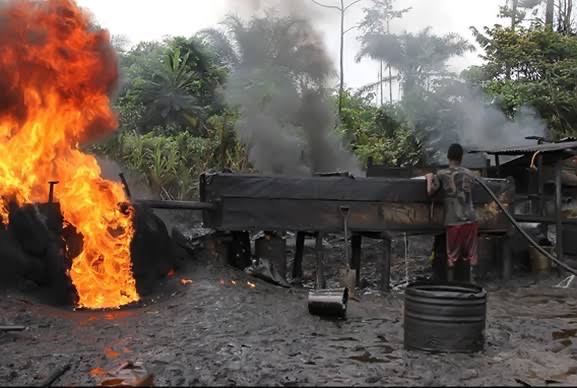
By Ridwanullahi Maraff
Despite government suppression, illegal refineries in Nigeria continue to succeed, with operators risking their lives for bank able profits. The oil-rich Niger Delta region is bedeviled by oil theft and illegal refining, with 6,800 illegal refineries uncovered in two years. Local refineries, constructed using rough and ready materials, are hidden in remote areas and bog, making perception difficult. Operators believe they have a right to the oil and connect illegal pipelines to pump crude oil from government and private companies. The illegal refineries produce petroleum products, making billionaires out of those involved. However, the environmental damage, economic losses, and human death are extremely, with hundreds of lives lost. The government’s efforts to shut off these refineries have been met with refusal to accept, and the circle of uncovering, demolition, and revival continues relentless.
The Nigeria Security and Civil Defense Corps (NSCDC) has charged community leaders of involvement in the rally of illegal refineries in Rivers State. According to NSCDC Public Relations Officer, Olufemi Ayodele, some community leaders plot with oil thieves, leading to the restore of illegal refineries after knocking down by security agents. A recent operation in Odagwa Community uncovered an illegal refinery with a 60,000 litre capacity. The agency blames lack of funds, logistics, and modern intelligence tools for the opposition in fighting illegal refineries. Ayodele calls for appropriate finance, retraining of officers, and associated social authority from international companies to fighting the threat. He also suggest control portable refineries and raising awareness that pipeline knock down and crude oil theft are unlawful act against the government and people.
The Nigeria Security and Civil Defense Corps (NSCDC) alert that illegal marketing in petroleum products, including operating illegal refineries, destruction, and oil theft, result in a notable threat to environmental livable and submerged life. Professor Ayo Ayoade, an energy law expert, credit the continuity of illegal refineries to undisciplinedspaces, corruption, and poor funding of security agencies. He patron for cooperative ownership of natural resources to give Niger Deltans a sight of belonging. Environmentalist Ola Oresanya censurethe Nigerian Navy’s act of burning illegal refineries, point to environmental pollution and health risks. The government faces an serious need to address systemic corruption, knock down illegal refining structure, and authorize communities to protect their resources and futures. The fate of Nigeria’s natural wealth and justifiable future depend in the stability.
